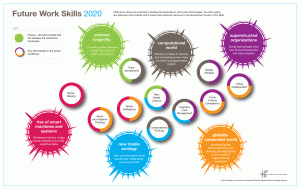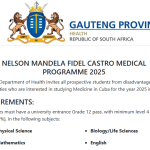Researchers at Harvard University once made three predictions about the future. First, they said, in the coming year, there would be more changes than ever before. Second in the coming year, there would be more competition than ever before. Third, in coming year, there would be more opportunities than ever before. The forth conclusion, which was contained in the footnote, said that those who do not adjust to the rapid rate of change, respond to the increase in completion or take advantage of the new opportunities available would be out of their jobs within two years.
The Institute for the Future (IFTF), released a research work, with vital information I know will interest you as a student, job seeker, professional, business owner or educator. You should take this report seriously and think of it as a standpoint to make important career/business/academic decisions.
“Global connectivity, smart machines, and new media are just some of the drivers reshaping how we think about work, what constitutes work, and the skills we will need to be productive contributors in the future.”
In a report by the Institute for the Future (IFTF), an independent, nonprofit strategic research group with more than 40 years of forecasting experience, located in Palo Alto, California, within the next 10years the skills required to acquire and retain key job, professional and business positions will tend towards defined global needs and innovation.
The core work of IFTF is to identify emerging trends and discontinuities that will transform global society and the global marketplace and provide insights into business strategy, design process, innovation, and social dilemmas. Research spans a broad territory of deeply transformative trends, from health and health care to technology, the workplace, and human identity.
The research was carried out by analyzing six drivers of change and then goes further to identify the ten future work skills required to keep up with these changes as they unfold. The research does not consider what specific jobs will be created but lays emphasis on the skills (proficiencies and abilities required across different jobs and work settings.) that these potential jobs will require. The impact of these drivers of change is already visible in today’s market, and the shift in skill requirements, so far, has been adaptive to these changes.

Few years ago, it’ll take a strong brand, from medium to large scale business and celebrities to develop a system to propel influx of loyal followers (customers). Ordinary people can rarely think of having access to a large group of fans or potential customers. With social networking sites like facebook, twitter and the newer Google+, and blogs, you can single handedly or as a team (preferably) build a database of friends and followers with common interest, who you can do repeated businesses with. This has significantly affected the way companies and individuals do business today. And the skills required to run businesses from this perspective is beyond what you acquire from a typical university degree.
Businesses now more than ever seek skilled individuals to build their team and not just people with high academic qualification.
10 years ago it was almost impossible for a Nigerian or African for that matter, to earn substantial income working from home. Today we have countless young and aged making fulltime living working from their home, regardless of location, qualification or demography; some building their own businesses and some working for companies or as a team. The world is changing at a faster pace and the only wise choice is to adapt rather than keep complaining about how bad the economy is. Your future and destiny is in your hands, drive it in the direction it ought to go.
Schools (secondary, post-secondary, universities, colleges and vocational) also need to adapt to these changes and teach students work related skills rather than hold on to the same routine that has existed for decades if not centuries. We cannot continue to study under the same curriculum and condition our fathers used. The work curriculum and conditions has changed dramatically. All the higher institution needs to do is to grow into the change. If not, Nigeria and other such African countries that remain nonchalant will be left far behind.
Click here to download a copy of the 2020 future work skill.
Sharing is caring. Remember to share this with your friends.









